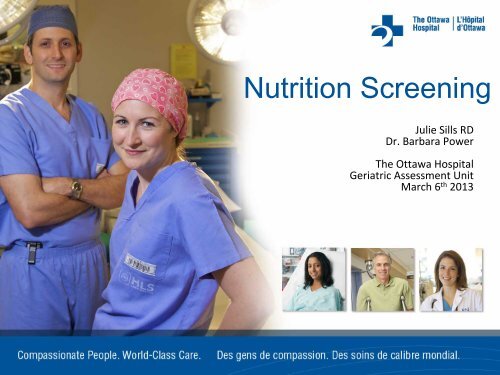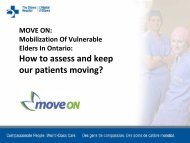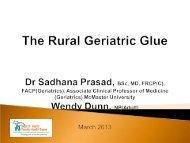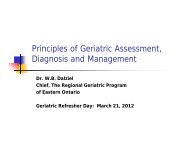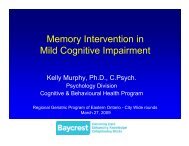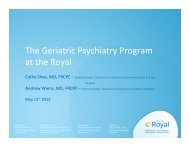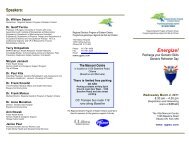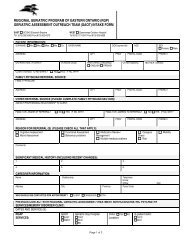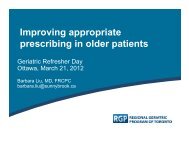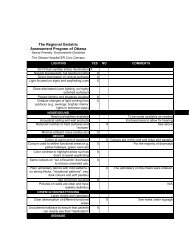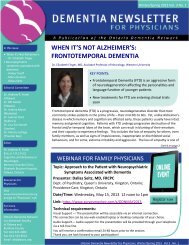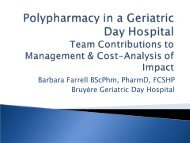Nutrition screening in the elderly
Nutrition screening in the elderly
Nutrition screening in the elderly
Create successful ePaper yourself
Turn your PDF publications into a flip-book with our unique Google optimized e-Paper software.
<strong>Nutrition</strong> Screen<strong>in</strong>g<br />
Julie Sills RD<br />
Dr. Barbara Power<br />
The Ottawa Hospital<br />
Geriatric Assessment Unit<br />
March 6 th 2013
Objectives<br />
1. Expla<strong>in</strong> how to take a patient’s diet history<br />
2. Be able to appreciate which patients might be<br />
at risk for malnutrition<br />
3. Be able to describe some <strong>in</strong>tervention<br />
strategies for patients with nutritional<br />
concerns
Personal Objectives
<strong>Nutrition</strong>al Assessment<br />
• Purpose:<br />
– Identify <strong>in</strong>dividuals who need nutrition<br />
<strong>in</strong>tervention<br />
– Confirm <strong>the</strong> presence of malnutrition (type and<br />
severity)<br />
– Establish a care plan<br />
– Evaluate <strong>the</strong> response to treatment<br />
• <strong>Nutrition</strong>al deficiency is associated with an<br />
<strong>in</strong>crease <strong>in</strong> morbidity and mortality
Malnutrition<br />
• Early detection and <strong>in</strong>terventions are key<br />
• Malnutrition is a condition characterized by:<br />
‣Overweight (20% more than desirable) with<br />
<strong>in</strong>creased body fat<br />
OR<br />
‣Underweight (10% less than desirable) with losses<br />
<strong>in</strong> lean body and subcutaneous fat stores
Malnutrition<br />
• Eat<strong>in</strong>g is <strong>in</strong>fluenced by:<br />
– Oral‐motor function<br />
– Appetite<br />
– State of awareness/mental state<br />
– Social norms<br />
– Religious beliefs<br />
– F<strong>in</strong>ancial situation
Malnutrition <strong>in</strong> Obesity<br />
• May be prote<strong>in</strong> and micro‐nutrient deficient<br />
• Overweight but undernourished<br />
• L<strong>in</strong>ked to high blood pressure, diabetes, heart<br />
disease, cancer, jo<strong>in</strong>t disease
Components of a<br />
complete nutrition assessment<br />
1. Medical and social history<br />
2. Biochemical data<br />
3. Anthropometrics<br />
4. Physical exam<strong>in</strong>ation<br />
5. Dietary history<br />
6. Estimation of energy, prote<strong>in</strong>, and fluid requirements<br />
Manual of Cl<strong>in</strong>ical Dietetics 6 th edition American Dietetic Association Dietitians of Canada 2000
Identify<strong>in</strong>g Priority Patients<br />
from <strong>Nutrition</strong> Screen<strong>in</strong>g<br />
• Diabetes<br />
• Prote<strong>in</strong>‐energy malnutrition<br />
• Gastro<strong>in</strong>test<strong>in</strong>al: Crohn’s disease, liver disease<br />
• Cancer<br />
• Catabolic states: burns, trauma, fever, <strong>in</strong>fection<br />
• Renal: acute or chronic kidney disease<br />
• O<strong>the</strong>r: alcoholism, dementia, CHF, COPD,<br />
pressure sores, obesity, dysphagia
Symptoms that may<br />
signal nutritional problems<br />
• Loss of appetite / decrease <strong>in</strong> appetite<br />
• Pa<strong>in</strong> or discomfort when eat<strong>in</strong>g or swallow<strong>in</strong>g<br />
• Weight loss / ga<strong>in</strong><br />
• Leg edema<br />
• Change <strong>in</strong> bowel habits, diarrhea, constipation,<br />
blood <strong>in</strong> stool<br />
• Slow heal<strong>in</strong>g wound / ulcer / sore
Drug‐Nutrient Interactions<br />
• Increas<strong>in</strong>g number of drugs leads to <strong>in</strong>creased risk<br />
for nutrient <strong>in</strong>teractions<br />
• Drugs can affect absorption, metabolism or excretion<br />
of nutrients and can lead to nutritional deficiences
Biochemical Parameters<br />
• Album<strong>in</strong><br />
• Hemoglob<strong>in</strong>, Ferrit<strong>in</strong>, iron, vitam<strong>in</strong> B12<br />
• Serum Folate<br />
• Lipid profile<br />
• Electrolytes, Creat<strong>in</strong><strong>in</strong>e
Anthropometrics<br />
The follow<strong>in</strong>g weight losses are considered severe and<br />
need fur<strong>the</strong>r <strong>in</strong>vestigation:<br />
• > 5% <strong>in</strong> 1 month<br />
• > 7.5% <strong>in</strong> 3 months<br />
• > 10% <strong>in</strong> 6 months<br />
• Body Mass Index: weight (kg)<br />
height(m) 2
Dietary History<br />
• Dietary and nutrition assessment should be<br />
part of <strong>the</strong> medical history
Dietary History<br />
<strong>Nutrition</strong>al <strong>in</strong>take is assessed by different methods<br />
• Purpose is to identify a person’s eat<strong>in</strong>g habits and to<br />
estimate <strong>the</strong>ir average daily nutrient <strong>in</strong>take.<br />
• 24 hour recall<br />
• 3‐day food record<br />
• “typical day”
Recommendations for Elderly at<br />
<strong>Nutrition</strong>al Risk<br />
• A vitam<strong>in</strong>‐m<strong>in</strong>eral supplement may be beneficial but<br />
cannot replace good eat<strong>in</strong>g habits!<br />
• Consider add<strong>in</strong>g nutrition supplements between meals.<br />
Supplements should not be used as a meal replacement.<br />
– (Boost or Ensure PLUS, Resource 2.0, Carnation Breakfast Anytime,<br />
Boost Diabetic, Glucerna)
Canada’s Food Guide
Acceptable Macronutrient Distribution Ranges:<br />
Age<br />
Group<br />
Carbohydrate Prote<strong>in</strong> Fat<br />
1‐3 years 45‐65% 5‐20% 30‐40%<br />
4‐18 years 45‐65% 10‐30% 25‐35%<br />
19 years<br />
and over<br />
45‐65% 10‐35% 20‐35%
CASE DISCUSSIONS<br />
GOALS
Bra<strong>in</strong>storm<strong>in</strong>g – <strong>Nutrition</strong>al Assessment<br />
• What questions could you ask <strong>the</strong> follow<strong>in</strong>g<br />
patients:<br />
A patient with CHF<br />
An <strong>elderly</strong> patient with weight loss<br />
A patient with renal problems<br />
A diabetic patient
Mrs. Suzanne<br />
• Age 80<br />
• Congestive Heart failure<br />
• Has Peripheral edema<br />
• She is on:<br />
– Furosemide 40 mg daily<br />
– Atorvastat<strong>in</strong> 80 mg daily
Dietary History<br />
• What Dietary questions would you want<br />
to pose to Mrs. Suzanne?<br />
• What recommendations would you make<br />
to Mrs. Suzanne?
Mrs. Judy<br />
• Age 85<br />
• Has lived alone s<strong>in</strong>ce her husband<br />
died a year ago<br />
• Appetite decreased <strong>in</strong> <strong>the</strong> past year<br />
• HTN<br />
• Tylenol for arthritis pa<strong>in</strong><br />
• Enalapril 10mg twice daily
Mrs. Judy<br />
• Weight: 45 kg<br />
• Height: 162.56 cm<br />
• Has a bad taste <strong>in</strong> her mouth
Mrs. Judy<br />
What Dietary Questions would you pose to<br />
Mrs. Judy?<br />
What recommendations would you make<br />
to Mrs. Judy?
• Age 82<br />
Mr. Denis<br />
• He has chronic renal failure<br />
• Variable appetite<br />
• He frequently has problems with<br />
hyperkalemia<br />
• Dr<strong>in</strong>ks alcohol daily (2 to 3 beers)
Mr. Denis<br />
What Dietary Questions would you pose to<br />
Mr. Denis?<br />
What recommendations would you make<br />
to Mr. Denis?
Questions to ask a patient with CHF<br />
Do you eat salty foods? Do you use salt <strong>in</strong> cook<strong>in</strong>g? Do<br />
you use <strong>the</strong> salt shaker?<br />
Do you eat ready‐made / convenience foods?<br />
Do you eat out at restaurants?<br />
What types of fluids do you dr<strong>in</strong>k (alcohol, milk, etc.)?
Questions to ask an<br />
<strong>elderly</strong> patient with weight loss<br />
When did you first lose your appetite?<br />
Can you remember what may have caused this loss of<br />
appetite?<br />
How much weight have you lost (and start<strong>in</strong>g when)?<br />
Who prepares meals at home?<br />
Do you take oral <strong>the</strong>rapeutic supplements? (ex. Ensure,<br />
Boost, Resource 2.0)<br />
Do you have any significant medical problems?<br />
Are You tak<strong>in</strong>g any medications?
Questions to ask a patient with<br />
How is your appetite?<br />
renal problems<br />
What meals and snacks do you eat dur<strong>in</strong>g <strong>the</strong> day?<br />
(emphasis on prote<strong>in</strong>s, Na, K+ and phosphorus)<br />
What types of fluids do you dr<strong>in</strong>k dur<strong>in</strong>g <strong>the</strong> day?<br />
How many cups of fluid do you dr<strong>in</strong>k every day?<br />
Do you dr<strong>in</strong>k alcohol?
Questions to ask a diabetic patient<br />
How often do you monitor your blood glucose levels at<br />
home? Can you give me your average read<strong>in</strong>g?<br />
Have you ever had hypo/hyperglycemia? If so, how was it<br />
treated?<br />
How many meals/snacks do you have at home? Do you<br />
have scheduled meal times? Do you skip meals?<br />
Give me an example of what you eat <strong>in</strong> a day (breakfast,<br />
lunch, supper, snacks)<br />
Do you exercise?
Consult<strong>in</strong>g a dietitian<br />
• Un<strong>in</strong>tentional or significant weight change<br />
• Prolonged poor <strong>in</strong>take, EtOH abuse or<br />
malabsorption<br />
• Patients requir<strong>in</strong>g oral <strong>the</strong>rapeutic<br />
supplements to optimize nutritional status<br />
• Dietary management of chronic diseases:<br />
heart failure, liver, renal, etc.<br />
• Dietary management of newly diagnosed<br />
diabetics or those with poor glycemic control
Conclusion<br />
• Certa<strong>in</strong> conditions can be managed with dietary<br />
changes<br />
• Drug‐nutrient <strong>in</strong>teractions and nutrient‐drug<br />
<strong>in</strong>teractions should always be considered<br />
• Weight status can not be used as a sole marker<br />
of risk for malnutrition<br />
…
Questions???


